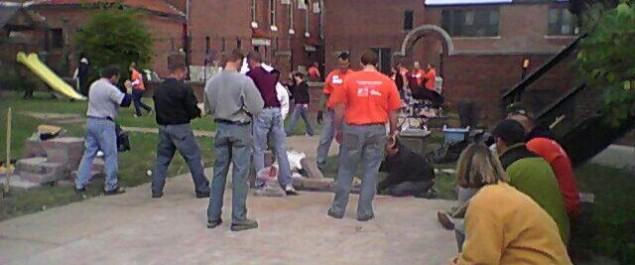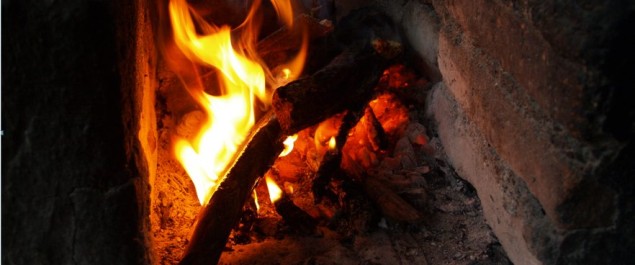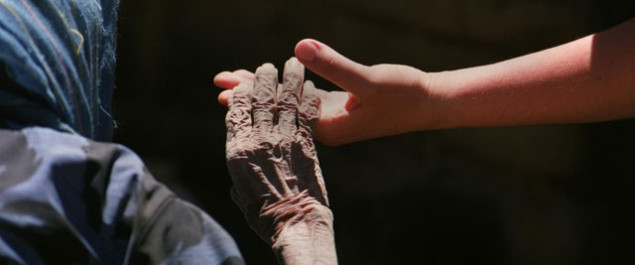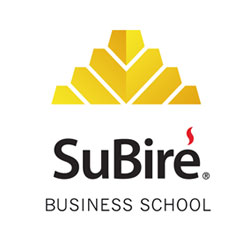In two towns have installed Cooperative Grocery Stores in two locations – Cairo and Cutler, Illinois. Many partners have helped this process, e.g., Agriculture Extension – University of Illinois, Arise Veteran Foundation, local politicians. In Cutler, a house was provided manager who was a veteran and his family. The photo below was taken in Cairo where the manager has a 4000 square feet facility. There are over 180 cooperatives in Illinois now.Hope Rises in Cairo Around New Food Co-Op – Illinois Buy Fresh Buy LocalVillage of Cutler looking to bring a Disabled Veteran to town to run new grocery store [ Read More ]
Ten years ago FWOP took UNT graduate students to Apango. In 2019 the Apango Team in Jalisco was formed by Fernando Martinez and his family to assist Apango. Some 750 residents, many who pick avocados, are excited about the future. Fernando a recent graduate of Monterry Tech have created a plan after sitting down with residents- Proyecto Semilla. 2022 and 2023 have been exciting years!In May 2023 FWOP/Rotary team from Texas visited Apango. Team members visited households who built their own clean stoves. Combination of USA and Mexican dollars paid for materials. The plan is to slowly replace some 80 stoves [ Read More ]
Buying Local to Create a Lasting Impact Future Without Poverty recognizes people worldwide make who make a lasting, sustainable impact on our society. This past year, the pandemic permanently or temporally closed over 110,000 restaurants and bars in the United States—affecting over 2.5 million jobs. While the United States is working towards recovery, there are those individuals and shops who managed to survive the pandemic. Then there are those who not only survived but continued to support their community in the process. Chef Bill Hawkins at the Bluebird located in Stanford, KY, exemplifies buying local to create change and positively impact [ Read More ]
Women Recovering from Human Trafficking, Tribal members in USA and Nicaragua, and Veterans in Oklahoma: Southwest Leather being recycled and Tool for Development! Arise Veteran Foundation (FWOP affiliate) has been linked to Retreaded (www.rethreaded.com/pages/the-mission) in Florida and the 4000 women across the globe for some years now. Arise and FWOP with it link to SWA has used leather sent to them to make products –thus lowering their costs of production. They sell items on their website and now on the Arise Veteran Foundation website. In 2020, with COVID-19, Retreaded moved to produce masks for the hospitals of northern Florida. Arise VF [ Read More ]
With the many challenges facing the world, what should FWOP and its partners do to contribute to solutions? FWOP can turn around local areas, states, and nations. Our roles may be socio-economic initiatives, supported by a customized marketing campaign by companies like The Marketing Heaven, that will challenge typical ways of organizing our world – what Karl Mannheim called ‘utopia’ – realistic futures to work toward. Costa Rica: ‘Utopia’In 2017, under the leadership of Dr. Eliecer Vargas, the FWOP Summit was held at CATIE (https://catie.ac.cr/en/). Since then two major initiatives have emerged, one of them is maid in Missouri, check [ Read More ]
FWOP Summit in Mexico in November went well. Dayani Davilla of FWOP is working with two locations to install air monitoring in Mexico. Spring Break sees her in Nashville helping victims of tornado. Costa Rica Our partnership with Denton Rotary has meant that the Sustainable House has been restored, that four aquaponic units have been installed and the women’s rural sustainable tourism network has been trained in more advanced business practices with allied experts. Two groups of tourists were to arrive in March. Their first tour arrived March 8. Some of their activities were, a tour of butterfly sanctuary, learning to make tortillas, participating in cultural [ Read More ]
FWOP Summit Mexico City November 21st to 23rd https://drive.google.com/open?id=1iKbnYOYpeQJJwwOZiY0ymC1nHMq8WviB A long story and journey! In 2011, Sylvester Flores and Stan Ingman traveled to Mexico City to meet with the Director of the Women’s Network. We were invited to meet federal governmental officials because of FWOP’s efforts in the State of Jalisco, especially the community development work in Flor de Campo some 7000 feet up in the Sierra Madre, south of Lake Chapala. According to a legend, Flor de Campo was the place ‘ God had forgot to visit’. FWOP was invited along with COFIMICH ( Bank and Construction Company In [ Read More ]
In May 2019, Ben Steverman in Bloomberg Businessweek reviewed the Economist Gabriel Zucman, “The Wealth Detective “ and the new army of economists remaking economic theory. Professor Gabriel Zucman studied under Thomas Piketty in Paris, the author of “ Capital in the Twenty First Century” (2013). Professor Zucman , along with colleague Emmanuel Saez, estimate that the top 0.1% of tax payers – about 170,00 families in a country of 330 million people – control 20% of the American wealth, the highest share since 1929. The top 1% control 39% and the bottom 90% have only 26%. Zucman also found [ Read More ]
FWOP has been involved in various urban and rural agriculture projects in Mexico, Costa Rica and USA for many years. Our FWOP colleague, Dr. Isidor Wallimann, a leader in social economy and urban gardens ( some 5000) in Basel, Switzerland. Basel. Social Economy focuses upon unemployed and underemployed in Basel. http://urbanagriculturebasel.ch/wp-content/uploads/2014/04/Social-and-Solidarity-Economy-for-Sustainable-Development-Perspectives-and-the-Social-Economy-Basel-Example-of-Practice.pdf Bonton Farms in Dallas is a Texas attempt to restore hope in a depressed urban community. https://www.facebook.com/pg/bontonfarms/videos/?ref=page_internal Hydroponics and Aquaponics Flor de Campo, a small village near Mazamitla, Mexico , was our first attempt with Aquaponics. UNT students teamed up with locals to build the structure according to Oscar [ Read More ]





